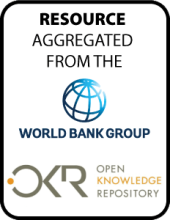Land Library
Welcome to the Land Portal Library. Explore our vast collection of open-access resources (over 74,000) including reports, journal articles, research papers, peer-reviewed publications, legal documents, videos and much more.
/ library resources
Showing items 1 through 9 of 886.This report was drafted by a working group of United Nations entities, the World Bank, and other stakeholders to suggest a common understanding of the blue economy; to highlight the importance of such an approach, particularly for small island developing states and coastal least developed countri
The current state of knowledge on climate change and water points to predominantly negative effects. This paper reviews the literature on these effects by geographical region and notes the differences as well as the uncertainties.
This Country Partnership Framework (CPF)
presents the World Bank Group (WBG) program and the
associated results framework for Lebanon for the period
FY17-FY22. In a fragile and conflict-prone environment, this
The new Country Partnership Framework
(CPF or framework) presents the engagement of the World Bank
Group (WBG) in Sri Lanka over the next four years (fiscal
years 2017-20 (FY17–20)). The CPF aims to support the
Lesotho is one of the poorest countries
in Southern Africa, and has one of the highest income
inequality in the world. Home to about 2 million people,
Lesotho is surrounded by South Africa, the second largest
This Country Partnership Framework (CPF)
covers the five-year period FY16-20. Anchored in the
government’s medium-term development plan as outlined in a
January 2015 Cabinet of Ministers Program of Action, it also
This program document presents the World
Bank Group (WBG) FY17-22 Country Partnership Framework (CPF)
for Bulgaria. The timing of the new CPF follows the
preparation of theSystematic Country Diagnostic (SCD)
The objective of this Poverty and Social
Impact Analysis (PSIA) is to assess the impact of systematic
registration on vulnerable individuals, in general, and
Roma, in particular. Specifically, this PSIA focuses on the
The geo-economy presents Lebanon with
challenges associated with being a nexus for regional fault
lines and risks from its dependence on capital inflows.
Despite markedly improved security conditions since the



